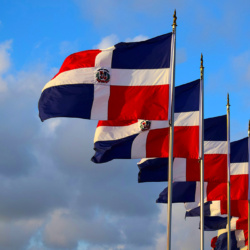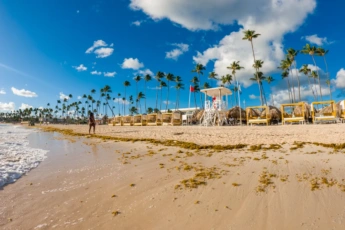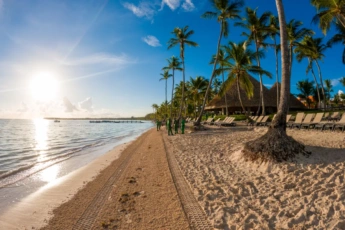Dominican Republic Visa Requirements - All You Need to Know in 2026

How to get residency in the Dominican Republic and main difficulties to obtain it in 2026
The Dominican Republic is a state located on the island of Haiti. Its shores are washed by the Caribbean Sea and the waters of the Atlantic Ocean. The republic boasts a mild climate. Despite the fact that it is…
Read more
Dominican Republic Visa – Frequently Asked Questions 2026
Choosing the Dominican Republic as the place to spend your unforgettable vacation, you can never go wrong. Despite this, before traveling, it is always worth considering all the details, including the documents for entry. The Dominican visa is something…
Read more
Punta Cana Airport (PUJ) – All information that you need in 2026: covid, statistics, transfers, hotels nearby
Punta Cana International Airport (PUJ) is the leading airport for travel to the Dominican Republic. So, it is convenient for many tourists since it offers direct flights from over 26 countries and 90 airports around the world. PUJ is…
Read morePlanning a visit to the Dominican Republic? Whether you’re going for business, vacation, or study, understanding the visa requirements is crucial. In this comprehensive guide, we will cover everything you need to know about obtaining a visa for the Dominican Republic.
Overview of the Dominican Republic Visa Requirements
The Dominican Republic is a popular tourist destination, and many nationalities can visit without a visa for short stays. However, depending on your citizenship, you may need a visa to enter the country. Let's explore the different types of visas available, the countries that require visas, and the process for obtaining one.
Types of visas
The Dominican Republic offers several types of visas, depending on the purpose of your visit. Below are the most common visa types:
- Tourist visa is for travelers visiting the Dominican Republic for tourism or leisure purposes.
- Business visas are for individuals attending meetings, conferences, or engaging in business activities.
- Student visa is for those wishing to study in the Dominican Republic for an extended period.
- Work visa is for foreign nationals employed by a Dominican company.
- Transit visa is for travelers passing through the Dominican Republic on their way to another country.
Countries that Need a Visa to the DR
Citizens of some countries are required to apply for a visa before traveling to the DR. Below is a table of countries whose nationals need a visa to enter:
Some of countries that need visa to enter the DR
| Country | Visa requirement | Details |
|---|---|---|
| Afghanistan | Visa required | All citizens of Afghanistan must apply for a visa before traveling. |
| Bangladesh | Visa required | Nationals of Bangladesh need to apply for a visa at a Dominican embassy or consulate. |
| Pakistan | Visa required | Pakistani nationals must obtain a visa in advance. |
| Nigeria | Visa required | Citizens of Nigeria are required to obtain a visa before entering the country. |
| Vietnam | Visa required | Visa applications must be processed through a Dominican embassy or consulate. |
In conclusion, travelers from certain countries, such as Afghanistan, Bangladesh, Pakistan, Nigeria, and Vietnam, must obtain a visa before entering the Dominican Republic. It is essential for citizens of these countries to apply for it through a Dominican embassy or consulate well in advance of their trip to ensure a smooth entry process.
Documents Required for a Dominican Republic Visa
When applying for a visa to the Dominican Republic, you will need to submit the following documents:
- A completed visa application form (available online or at the embassy).
- A valid passport with at least 6 months of validity from the date of entry.
- Two passport-sized photos.
- Proof of travel arrangements (flight tickets, hotel reservations, etc.).
- Proof of sufficient funds to cover the duration of your stay.
- Visa fee (varies by visa type and nationality).
- A letter of invitation (for business and family visit visas).
How to Apply for a Dominican Republic Visa
The visa application process for the Dominican Republic is relatively straightforward, but it may vary slightly depending on your location. Here’s a step-by-step guide:
- Complete the application form. Visit the Dominican Republic's embassy or consulate website and fill out the online visa application form.
- Prepare the required documents. Gather the necessary documents listed above.
- Submit the application. Submit your completed form and documents to the nearest Dominican embassy or consulate.
- Pay the fee. Pay the required fee, which varies by nationality and visa type.
- Wait for processing. Wait for your visa to be processed. This typically takes between 5 to 15 business days.
- Receive your visa. Once approved, you will receive your visa either via mail or in person, depending on your embassy’s procedures.
Dominican Republic Visa Exemptions Countries
Citizens of certain countries do not need a visa to enter the Dominican Republic for tourism purposes. These countries are typically members of the Caribbean Community (CARICOM) or have special agreements with the Dominican government. Below is a table of countries whose nationals do not need a visa:
List of countries that don't need visa to the DR
| Country | Visa exemption | Duration of stay |
|---|---|---|
| United States | Visa-exempt | Up to 30 days (extendable for up to 60 days) |
| Canada | Visa-exempt | Up to 30 days (extendable for up to 60 days) |
| European Union Countries | Visa-exempt | Up to 30 days |
| Brazil | Visa-exempt | Up to 60 days |
| Mexico | Visa-exempt | Up to 30 days |
Citizens from countries such as the United States, Canada, European Union nations, Brazil, and Mexico enjoy exemptions for tourism purposes when visiting the Dominican Republic. These nationals can stay for a limited duration, typically ranging from 30 to 60 days, with the possibility of extending their stay. This facilitates smoother travel for visitors from these regions, promoting tourism and business exchanges with the Dominican Republic.
Keynotes
Visitors to the Dominican Republic may need either a tourist visa or a Tourist Card, depending on their nationality. Citizens from countries like the US, EU, and several others can stay up to 30 days without a visa, though a Tourist Card may be required. Tourist Visas are valid for 60 days and can be extended, while Tourist Cards typically cost around $10. It is also important to ensure that passports are valid for at least six months beyond the planned departure date.
Frequently asked questions about
visa to the Dominican Republic
1. Do I need a visa to go to the Dominican Republic?
Whether you need a visa to visit the Dominican Republic depends on your nationality and the purpose of your visit. Citizens of some countries can enter the Dominican Republic without a visa for tourism purposes, while others require a visa. General guidelines:
- For most tourists, a visa is not required if the visit is for tourism and the stay is shorter than 30 days. However, travelers are typically required to purchase a Tourist Card (costing about $10 USD) upon arrival at the airport. This is generally issued to those from countries that do not have a visa exemption agreement with the Dominican Republic.
- If you plan to stay longer than 30 days or move to the Dominican Republic, you will need to apply for a residence visa. The process for obtaining residency may vary depending on your nationality and type of residence application.
2. Which countries are visa free for the Dominican Republic?
Citizens of many countries can visit the Dominican Republic for short stays without requiring a visa. Below is a list of some of the countries whose citizens do not need a visa to visit the Dominican Republic for tourism:
- European Union countries (e.g., France, Germany, Italy, Spain)
- United States
- Canada
- Mexico
- Japan
- South Korea
- Australia
- New Zealand
- Brazil
- Argentina
- Chile
This is not an exhaustive list. For citizens of certain countries, only a tourist card is required. You can check the official Dominican Republic consular website or consult your local embassy for a more comprehensive list of visa-exempt countries.
3. Is Schengen visa valid for the Dominican Republic?
No, a Schengen visa is not valid for entry into the Dominican Republic. The Dominican Republic does not participate in the Schengen Area, and therefore, holding a valid Schengen visa does not grant entry to the country.
If you hold a Schengen visa and are traveling to the Dominican Republic, you will still need to obtain a Tourist Card or a visa, depending on your nationality.
4. Do you need a visa to holiday in the Dominican Republic?
In most cases, if you’re visiting the Dominican Republic for tourism and plan to stay for a short period (up to 30 days), you will not need a visa. Travelers from visa-exempt countries will only need to purchase a Tourist Card on arrival, which costs about $10 USD.
However, if you intend to stay for more than 30 days, you will need to apply for a tourist visa or, in some cases, a residence visa, depending on your situation and nationality.
5. What is the strongest passport in the world?
As of recent reports, the Japanese passport is considered the strongest passport in the world in terms of visa-free or visa-on-arrival access to other countries. Passport rankings:
- Japan has visa-free access to 193 destinations.
- Singapore has visa-free access to 193 destinations.
- South Korea has visa-free access to 191 destinations.
- Germany has visa-free access to 190 destinations.
This ranking may change over time as countries update their visa policies. Strong passports allow holders to travel freely to a large number of countries without the need for a visa, which facilitates business and tourism.
6. Is the Dominican Republic a Schengen country?
No, the Dominican Republic is not a Schengen country. The Schengen Area refers to a group of European countries that have abolished border controls between them for free movement of people. The Dominican Republic, located in the Caribbean, is not part of this agreement. Therefore, the Schengen visa is not valid for entry into the Dominican Republic.
If you are planning to visit the Dominican Republic, you need to check the visa requirements based on your nationality and the purpose of your visit.
7. What not to bring to the Dominican Republic?
While traveling to the Dominican Republic, there are certain items you should avoid bringing, as they may be prohibited or restricted. Here’s a list of items you should not bring:
- The Dominican Republic has strict anti-drug laws. Bringing drugs or other illegal substances into the country can result in severe penalties, including imprisonment.
- You must declare any firearms or ammunition to customs. Importing weapons without authorization can lead to serious legal consequences.
- Any form of pornography is prohibited in the Dominican Republic. Importing such material can lead to confiscation and legal penalties.
- The importation of products made from endangered species (e.g., coral, ivory, certain animal skins) is restricted under international wildlife conservation laws.
- Bringing counterfeit products into the Dominican Republic is illegal. This includes fake brand-name clothing, electronics, and accessories.
Additionally, it’s a good idea to avoid bringing excessive quantities of alcohol or tobacco for personal use, as these may raise questions about whether they are intended for resale.
8. How much does a Dominican visa cost?
The cost of a Dominican Republic visa varies depending on the type of visa, your nationality, and the purpose of your visit. Here are some general guidelines:
- For most nationalities that require a visa, the fee is approximately $125 USD. This may vary slightly depending on your country of origin.
- The cost of a residency visa is more variable and depends on the type of residency application. The fees typically range from $200 USD to $400 USD, but additional costs for medical checks, translations, legal documents, and other paperwork might also apply.
- Short-term visas, including business or student visas, generally cost between $100 USD and $200 USD.
It’s important to check with the Dominican Republic consulate in your country for precise, up-to-date visa fees and requirements.
9. Can I travel without an e-ticket?
In most cases, you cannot travel without an e-ticket, especially for international flights. The e-ticket is an electronic version of the traditional paper ticket and serves as your proof of purchase for the flight. Airlines require this document to confirm your booking, check you in, and provide boarding passes.
However, some low-cost carriers or smaller regional airlines may allow you to book a flight without an e-ticket, but they generally provide one soon after booking. It is strongly recommended to carry a copy (either printed or digital) of your e-ticket when traveling internationally to avoid complications.
10. What documents do I need to go to the Dominican Republic?
When traveling to the Dominican Republic, you will typically need the following documents:
For tourists:
- A valid passport with at least six months of validity from your planned arrival date.
- If you are from a country that requires a Tourist Card, you can purchase this card upon arrival for around $10 USD. Citizens from certain countries are exempt from this requirement.
- Proof of your return or onward travel from the Dominican Republic, such as a plane ticket.
- In some cases, you may be asked to show that you have sufficient funds to support your stay in the country.
- If your nationality requires a visa to enter, ensure you have a valid Dominican Republic visa in addition to your passport.
For residency applicants:
- As with tourists, a passport is required.
- You must demonstrate legal entry into the country (usually through a tourist visa or entry stamp).
- A medical certificate, proving you are free of certain diseases (such as HIV, tuberculosis, etc.), may be required for residency applications.
- Proof of income or financial resources is often required for those applying for residency.
- A police background check or clean criminal record certificate from your home country may be required for certain types of residency applications.
Make sure to check with the Dominican consulate for specific requirements based on your nationality and the purpose of your visit or stay.
11. How do I get a Dominican visa?
To get a Dominican Republic visa, the process depends on your nationality and the purpose of your visit. Here’s a general outline of how to apply:
- Depending on your country of citizenship, you may or may not need a visa. Citizens from certain countries are exempt from obtaining a visa for short stays (e.g., tourism up to 30 days). Check the official Dominican Republic consular website or contact your local embassy.
- The required documents may vary based on the type of visa you’re applying for. Generally, you will need a valid passport (with at least 6 months validity), a completed visa application form, passport-sized photos, and proof of financial support during your stay (bank statements, pay slips, etc.), travel itinerary, including flight bookings and accommodation details, tourist card fee (if applicable).
- You can submit your application at the Dominican consulate or embassy in your country. Some consulates may allow you to apply online.
- Visa fees vary depending on the type of visa (tourist, business, residency, etc.). The fee for a tourist visa is typically around $125 USD.
- Processing times can vary but typically take around 3-7 business days. However, this can be longer, so apply well in advance.
- Once approved, you will receive your visa either via post or for pick-up, depending on the consulate’s procedures.
12. What is an e-ticket for the Dominican Republic?
An e-ticket for the Dominican Republic is the electronic version of a flight ticket that you receive after booking a flight. It is essentially a digital ticket that contains all the details of your flight booking, including:
- Passenger’s name
- Flight number
- Departure and arrival airports
- Date and time of the flight
- Seat assignment (if applicable)
- Payment details
The e-ticket is issued by the airline and serves as proof of your booking and payment for the flight. When traveling to the Dominican Republic, the airline will use the e-ticket to check you in for your flight.
13. How much is a Dominican E-ticket?
The Dominican E-ticket refers to the Tourist Card required by many travelers when entering the Dominican Republic. The cost of this E-ticket or Tourist Card is typically around $10 USD. It can be purchased in advance online through the official Dominican Republic government website or at the airport upon arrival.
The Tourist Card allows you to stay in the Dominican Republic for up to 30 days and is usually part of the entry process for visitors from countries that do not require a visa. However, this E-ticket does not replace a visa if one is required for your nationality.
14. Do I need malaria tablets for the Dominican Republic?
Malaria is not a significant concern in the Dominican Republic, particularly in popular tourist destinations like Punta Cana, Santo Domingo, and Puerto Plata. However, if you are planning to visit more rural or less-developed areas, particularly in the southern and western parts of the country, the risk of malaria may be higher, especially during the rainy season (from May to November).
15. What vaccines are required for the Dominican Republic?
The Dominican Republic does not require any specific vaccinations for entry, but certain vaccines are recommended for travelers to protect their health, especially if you plan to stay long-term or visit rural areas. recommended vaccines for travelers:
- Hepatitis A: Recommended for all travelers to the Dominican Republic, as it can be contracted through contaminated food or water.
- Hepatitis B: Recommended for travelers who may have direct contact with blood or bodily fluids, such as those planning extended stays or healthcare workers.
- Typhoid: Recommended for travelers visiting rural areas or those who may be exposed to contaminated food or water.
- Tetanus/Diphtheria: Ensure your routine vaccines are up to date, including tetanus and diphtheria.
- Measles, Mumps, Rubella (MMR): If not already vaccinated, this is recommended, especially for travelers coming from regions where these diseases are more common.
- Malaria is not a major concern in most tourist areas but may be considered if traveling to more rural parts of the country.
- Influenza: The flu vaccine is generally recommended, especially if you’re traveling during flu season (typically from fall to early spring).
Make sure to consult with a travel health specialist or your healthcare provider at least 4-6 weeks before your trip to get the appropriate vaccines and health advice based on your travel plans.



